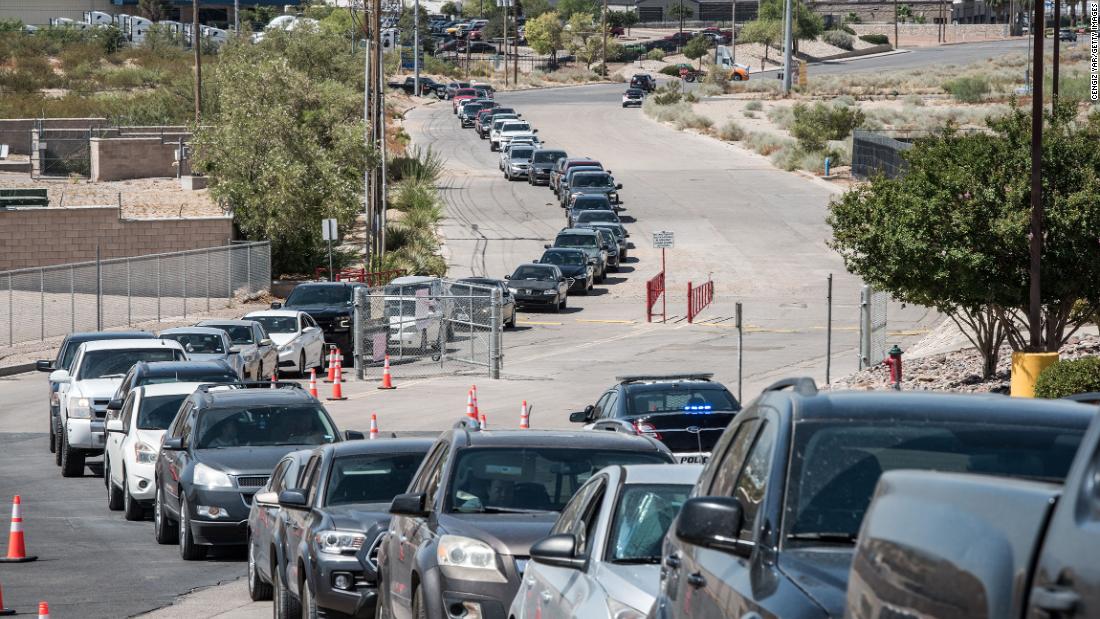
This time, the seven-day average of daily new cases reached an all-time high of 68,767 on Sunday, according to data from Johns Hopkins University. The previous record of 67,293 was set July 22.
"Unfortunately, I think the statement about 'new record' is going to be repeated over and over again in the days and weeks to come," said Dr. Ashish Jha, dean of the Brown University School of Public Health.
"I expect that those numbers will continue to climb. Hospitalizations are going to continue to climb."
The abysmal week was marked by the two worst days of daily new cases reported since the pandemic began. More than 83,000 new cases were reported both Friday and Saturday, according to Johns Hopkins.
To be clear: This surge reflects an onslaught of new infections -- not just increased testing, contrary to what skeptics claim.
"You know why we have cases? Because we test so much," President Donald Trump claimed during a rally Saturday in North Carolina. "And in many ways, it's good. And in many ways, it's foolish."
But the seven-day average of new Covid-19 cases has soared 23% in the past week, according to Johns Hopkins data. The seven-day average of new tests performed has risen only 2.87% over the past week, according to the Covid Tracking Project.
What happens when hospitals get overwhelmed
Some hospitals are starting to max out due to the new surge. And that's bad news for everyone -- not just those with coronavirus.
"We've seen what happened earlier in this pandemic, when hospitals become overwhelmed and patients end up not receiving care -- not only patients with coronavirus, but also patients with heart attacks and strokes and were in car accidents," emergency medicine physician Dr. Leana Wen said.
In Utah, for example, hospitals could be days away from using a patient's age, health and other factors to decide who can stay in crowded intensive care units, and who won't.
"That potentially could be occurring all over the country as our hospitals become overwhelmed," Wen said. "And unlike last time, where it was only certain parts of the country that were experiencing this, now we have virus hotspots that are occurring everywhere."
As of Monday, at least 37 states had growing numbers of new Covid-19 cases this past week compared with the previous week, according to Johns Hopkins data. Thirteen states were holding roughly steady, and no state had Covid-19 decreases of at least 10%
More than 8.6 million people have been infected with coronavirus in the US, and more than 225,000 have died.
We have 'a narrow window of opportunity right now'
Yes, the dreaded fall surge is spreading across the country. But if we act quickly, we can prevent it from turning into a catastrophic winter surge, doctors say.
"This is not inevitable. We actually have a narrow window of opportunity right now to stop the explosive spread that is coming," Wen said Monday.
"But we have this window to take action now. That includes things like national mask mandates, that includes other targeted policies. This is not an all-or-nothing," she said.
"President Trump tends to frame this as either we shut down completely, or we literally do nothing. Actually, there's a lot that we can do that will both save lives and also keep our economy going. We should implement those policies now."
A national mask mandate could help keep businesses open
A growing number of officials from across party lines are calling for a nationwide mask mandate.
Dr. Scott Gottlieb, the former head of the Food and Drug Administration appointed by Trump, wrote an op-ed for The Wall Street Journal titled "Winter Is Coming: Time for a Mask Mandate."
"A mandate can be expressly limited to the next two months," Gottlieb wrote, adding that it's easier to wear a mask in the winter than the summer.
"The inconvenience would allow the country to preserve health-care capacity and keep more schools and businesses open."
Andy Slavitt, former acting chief of the Centers for Medicare and Medicaid Services, agreed with Gottlieb on a mask mandate.
"Scott Gottlieb was a Republican. This is not a partisan issue," said Slavitt, who served in the Obama administration.
"This is an issue for everyone's public health, and will slow down the spread of the disease."
If 95% of Americans wore masks in public, more than 100,000 lives could be saved in the United States through February, according to data released Friday by the Institute for Health Metrics and Evaluation at the University of Washington.
"If people are not wearing masks, then maybe we should be mandating it," said Dr. Anthony Fauci, director of the National Institute of Allergy and Infectious Diseases.
Gottlieb wrote that mask mandates have become divisive only because of the way some politicians and political commentators have framed the issue.
"States should be able to choose how to enforce a mandate," he wrote, "but the goal should be to make masks a social and cultural norm, not a political statement."
"case" - Google News
October 27, 2020 at 12:23AM
https://ift.tt/35vAUkw
The US had more daily Covid-19 cases in the past week than ever before. And no, it's not just due to more testing - CNN
"case" - Google News
https://ift.tt/37dicO5
https://ift.tt/2VTi5Ee
Bagikan Berita Ini














0 Response to "The US had more daily Covid-19 cases in the past week than ever before. And no, it's not just due to more testing - CNN"
Post a Comment